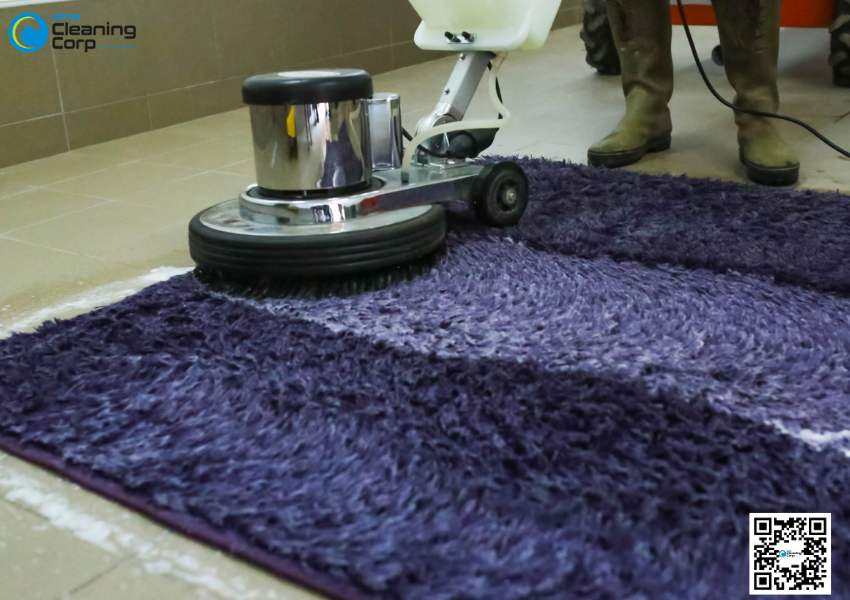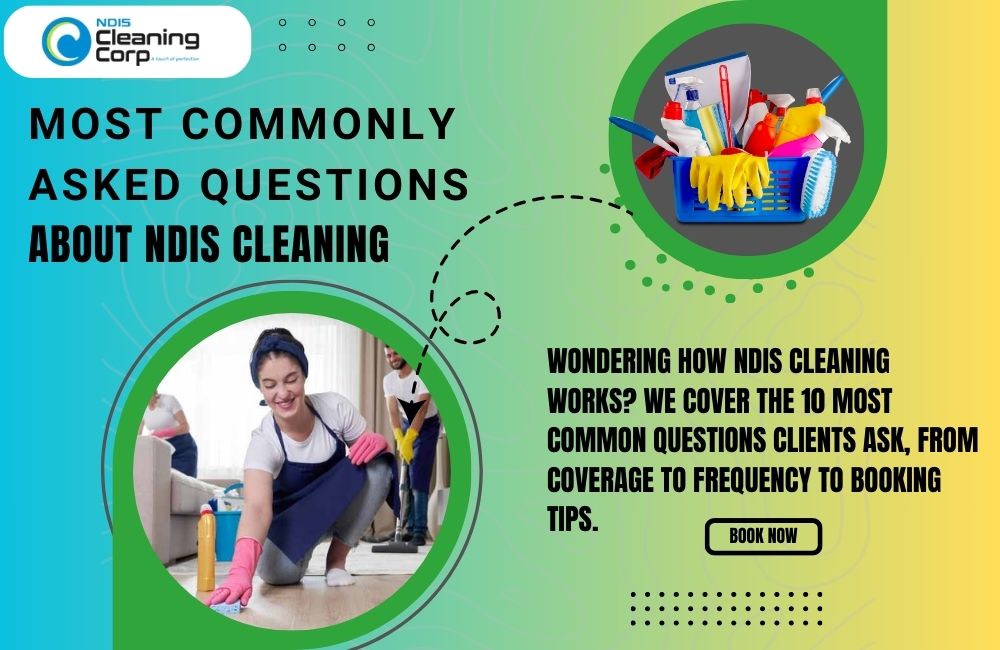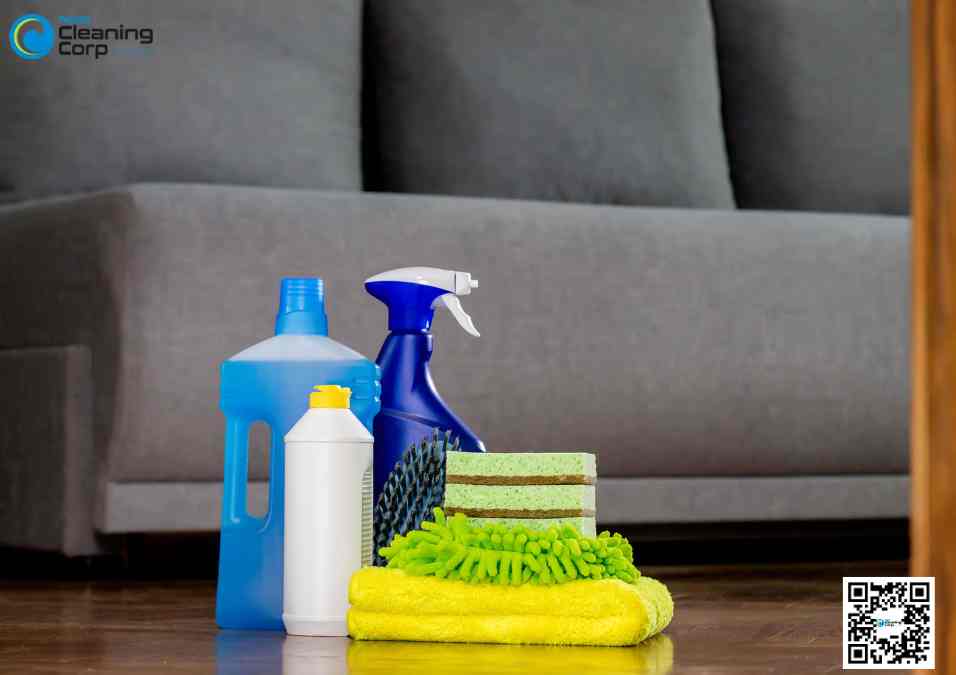Does the NDIS Fund Cleaning Services?
Yes. The NDIS does fund cleaning services — but it...
Professional cleaning holds a crucial role in supporting the NDIS (National Disability Insurance Scheme) by creating a safe living environment for individuals with disabilities.
The NDIS is designed to support people with disabilities by providing personalized services and support tailored to their unique needs. This support extends to ensuring that their homes are well-maintained and hygienic, which is vital for their overall well-being.
Maintaining a clean environment is essential for NDIS participants as it directly affects their health, safety, and quality of life. Regular professional cleaning helps manage health risks and promotes a sense of independence, which is a key goal of the NDIS.

The National Disability Insurance Scheme (NDIS) is a government initiative in Australia designed to provide financial and practical support to individuals with disabilities. The scheme’s primary goals are to enhance independence, improve quality of life, and support participants in achieving their personal goals.
Professional cleaning aligns with these goals by ensuring that homes are clean, safe, and well-maintained. A clean environment helps to mitigate health risks such as allergies and infections, which is crucial for individuals with disabilities who may be more vulnerable to these issues.
For instance, a study by the University of Sydney found that a clean and organized living space can reduce the incidence of respiratory issues and improve mental health. This is particularly relevant for NDIS participants, who often have complex health needs.
Real-life Example: A Family’s Experience with NDIS and Cleaning Services
Consider the story of the Smith family. The Smiths, whose teenage daughter has a mobility impairment, faced challenges in maintaining their home. After securing NDIS funding for professional cleaning services, the family’s home became more accessible and hygienic. The cleaning service helped manage daily tasks such as dusting and vacuuming, which significantly improved the daughter’s comfort and safety.
Health and Safety Improvements
Professional cleaning provides substantial health and safety improvements. Regular cleaning reduces dust, mold, and allergens, which are critical for individuals with respiratory conditions or compromised immune systems. According to the Australian Institute of Health and Welfare, maintaining a clean home environment can lower the risk of chronic health issues and improve overall well-being.
For example, NDIS cleaning services often include thorough disinfection and sanitization, which are essential for preventing the spread of infections and ensuring a safe living environment.
Enhanced Quality of Life
A clean and organized home not only supports physical health but also enhances the quality of life for NDIS participants. A well-maintained home can promote independence and comfort, allowing individuals to focus on their personal goals rather than managing household chores.
Case Study: Positive Outcomes for a Family Using NDIS Cleaning Services
Take the case of the Patel family, who utilized NDIS-supported cleaning services to help manage their home after their son was diagnosed with a chronic condition. The introduction of professional cleaning significantly improved the family’s living conditions. The cleaner’s regular visits ensured that the home remained clean and safe, leading to fewer health issues and a better overall quality of life for the son.
Factors to Consider When Selecting a Professional Cleaning Service
When selecting a professional cleaning service under the NDIS framework, several crucial factors must be evaluated to ensure that the service aligns with NDIS goals and participant needs.
Questions to ask potential cleaning providers
To ensure the cleaning service meets NDIS standards and addresses specific needs, ask the following questions:
Example: How a Family Chose Their Cleaning Service Provider
The Johnson family, whose daughter has a severe respiratory condition, needed a specialized cleaning service. They evaluated several NDIS-approved providers and chose one with a strong reputation for using hypoallergenic cleaning products. The family’s decision was influenced by the provider’s positive client reviews and their ability to accommodate specific cleaning needs outlined in the service agreement.
NDIS funding for cleaning services is designed to support participants by covering costs associated with maintaining a clean and safe living environment. Funding for cleaning tasks is available under the home and living support category, which includes routine house maintenance and specialized cleaning services.
Types of Cleaning Services Covered
Under the NDIS plan, the following types of cleaning services are typically covered:
Example: Navigating NDIS funding for a family’s cleaning needs
The Lee family, managing a home with multiple NDIS participants, utilized their NDIS funding to cover both routine and deep cleaning services. They worked with their NDIS planner to allocate funds effectively and chose a cleaning service that provided a comprehensive package, including regular maintenance and specialized deep cleaning.
In-Depth Look at Families Who Have Benefited from Professional Cleaning Services
Several families have shared their positive experiences with NDIS-supported cleaning services. These success stories illustrate the impact of maintaining a clean home on the overall quality of life for NDIS participants.
Specific Examples of Improvements in Daily Life
Testimonials from Families
Families utilizing NDIS-supported cleaning services may encounter several challenges that impact the effectiveness of the service. Understanding these common issues and knowing how to address them can help improve the overall experience.
Strategies to Overcome These Challenges
To effectively navigate these challenges, families can implement several strategies:
Example: A Family’s Journey Through Overcoming Cleaning Service Challenges
The Johnson family faced difficulties with their NDIS cleaning service due to inconsistent service quality and communication gaps. They resolved these issues by:
Through these steps, the Johnsons improved the quality and consistency of their cleaning service, enhancing their home environment and meeting their specific needs.
What is NDIS, and How Does It Relate to Professional Cleaning?
The National Disability Insurance Scheme (NDIS) provides funding and support to individuals with disabilities to help them achieve their goals and improve their quality of life. Professional cleaning is one of the services covered under the NDIS, aimed at maintaining a safe and clean living environment for participants. This support helps enhance the participants’ overall well-being and independence by ensuring their home meets NDIS quality standards.
How Can I Find a Professional Cleaning Service that Works with NDIS?
To find a professional cleaning service that works with the NDIS:
What Types of Cleaning Services are Covered by NDIS?
The NDIS covers various types of cleaning services, including:
How Can Professional Cleaning Improve the Quality of Life for NDIS Participants?
Professional cleaning services can significantly improve the quality of life for NDIS participants by:
Maintaining a clean environment is crucial for NDIS participants as it directly impacts their health, safety, and overall well-being. Professional cleaning services play a vital role in ensuring that homes are safe, hygienic, and tailored to the specific needs of individuals with disabilities. By integrating professional cleaning with NDIS support, families can enhance the quality of life for their loved ones and create a more comfortable and functional living environment.
Families are encouraged to thoroughly explore NDIS-supported cleaning services to find the right provider that meets their needs. Choosing the right cleaning service involves considering factors such as NDIS approval, service quality, and provider reputation. By doing so, families can ensure a healthier and safer home environment for their loved ones, ultimately supporting their overall well-being and independence.
More Post

Yes. The NDIS does fund cleaning services — but it...

Alright, let’s get straight into it. These are the questions...

NDIS cleaning services are specifically designed to cater to the...

The role of professional cleaning in maintaining a safe and...

Studies consistently show that living in a clutter-free, organized space...